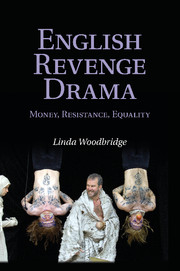Book contents
- Frontmatter
- Contents
- List of figures
- Acknowledgments
- English revenge plays discussed in this book
- Standard MLA abbreviations for Shakespeare's plays
- Note on the text
- PART I RAMPANT REVENGE
- PART II ECONOMIC UNFAIRNESS: REVENGE AND MONEY
- PART III POLITICAL UNFAIRNESS: REVENGE AND RESISTANCE
- PART IV SOCIAL UNFAIRNESS: VENGEANCE AND EQUALITY
- Conclusion
- Bibliography
- Index
Conclusion
Published online by Cambridge University Press: 06 December 2010
- Frontmatter
- Contents
- List of figures
- Acknowledgments
- English revenge plays discussed in this book
- Standard MLA abbreviations for Shakespeare's plays
- Note on the text
- PART I RAMPANT REVENGE
- PART II ECONOMIC UNFAIRNESS: REVENGE AND MONEY
- PART III POLITICAL UNFAIRNESS: REVENGE AND RESISTANCE
- PART IV SOCIAL UNFAIRNESS: VENGEANCE AND EQUALITY
- Conclusion
- Bibliography
- Index
Summary
Now I have kept my word; torments I scorn.
I leave the world with glory. They are men
And leave behind them name and memory,
That wronged do right themselves before they die.
The Duke of MilanHistorically, one resonant use of “equal” has been “we hold these truths to be self-evident: that all men are created equal.” The Declaration of Independence also calls on American colonies to “assume among the powers of the earth” a “separate and equal station.” When its author, Thomas Jefferson, reflected in 1826, fifty years after its signing, what stood out for him was the Declaration's passion for equality: ten days before his death he wrote, “The mass of mankind has not been born with saddles on their backs, nor a favored few booted and spurred, ready to ride them legitimately.” He must have been thinking of the seventeenth century as he lay dying, for he borrowed these words from a New Model Army radical, Richard Rumbold, who affirmed on the scaffold that “no man [was] born marked of God above another; for none comes into the world with a saddle on his back, neither any booted and spurred to ride him” (3). Helping to hatch the Rye House plot to assassinate Charles II and finally executed for plotting a revolt against James II, Rumbold was once an army dissident, petitioning General Fairfax to reinstate soldiers' elected representatives.
- Type
- Chapter
- Information
- English Revenge DramaMoney, Resistance, Equality, pp. 271 - 276Publisher: Cambridge University PressPrint publication year: 2010



